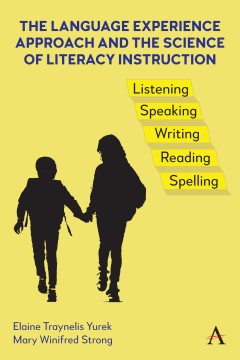The Language Experience Approach and the Science of Literacy Instruction
By Elaine Traynelis Yurek & Mary Winifred Strong
Other Formats Available:
- About This Book
- Reviews
- Author Information
- Series
- Table of Contents
- Links
- Podcasts
About This Book
The information contained in this text covers kindergarten, primary grades, middle school, and secondary school. It presents a balanced body of information for instruction between wholistic approaches and traditional approaches for the total literacy curriculum. This book includes the complete developmental aspects of skills necessary for competence in all literacy tasks from birth to adolescent literacy, the need for availability for teachers to assess the progress of all of these skills as they are presented in a wholistic fashion on a regular basis, the criteria of how decisions are made for remedial reading instruction, the interface of special education considerations for students experiencing literacy challenges, approaches for adolescent literacy programs, and abundant information on teaching English language learners. Two chapters are devoted to the writing process. The first one explains the necessary information which is a prerequisite to writing, and the second examines all aspects of writing which includes many professional forms of writing, the assessment of writing, andspecialized methods of teaching writing.A unique feature of this text is its integration of multiple wholistic approaches, with an emphasis on research validation of approaches, descriptions of the different ways that literacy can be taught in today’s schools, explanations of the clinical techniques available for literacy instruction, information on the science that is illustrating to us as educators on how the brain and central nervous system are intricately involved with the literacy processes, and discussions of the implementation of materials that may enhance perceptual processing for some students. Now more than ever we know that skill in literacy is a foundational skill that impacts all learning a student undertakes throughout their formal education, into the workplace and on to graduate studies. Thus, it is imperative to equip teachers with perspective and a skill set to address needs in the classroom. Thus, this text may not only be considered a teaching tool but also a handbook of approaches and reference guide for conditions that are not included in current textbooks.
In looking back at our 20 years of research using LEA with different populations, we have concluded that this 50-year-old method for literacy instruction is as viable today as it was in 1971 when it was developed by Russell Stauffer.
Reviews
“Elaine Traynelis Yurek and Mary Winifred Strong provide a comprehensive argument for implementing the language experience approach for developing students’ literacy capabilities. They revisit early ground-breaking research and examine current research that demonstrates the impact of literacy instruction that is grounded in students’ language, experiential histories, and capabilities. Rich contexts for learning are at the center of their instructional recommendations.” —Victoria J. Risko, EdD, Professor Emerita, Vanderbilt University, USA.
“It is a great summary of various strategies to teach reading to both typical and neurotypical readers. It is hard to find accurate information on so many varied approaches in one text. The power of a student’s own language should not be ignored. This is a resource every teacher of reading should have on their shelves!” —Nancy Foy, Head of School, The New Community School, USA.
Author Information
Dr. Elaine Traynelis Yurek has a strong research background in the areas of literacy, learning disabilities, emotional disturbance, and attention deficit disorders. She has presented and published extensively in these areas.
Dr. Mary Winifred Strong has published over 30 articles on reading methodology in state, national, and international journals and proceedings; written several book chapters in literacy and international proceedings; and coauthored a textbook on literacy coaching.
Series
Table of Contents
List of Figures; Acknowledgments; Introduction: LEA and the Science of Literacy Instruction; Chapter 1 Reading Development as Part of Literacy Development; Chapter 2 Language Development ; Chapter 3 The Development of Early Skills for Literacy Proficiency; Chapter 4 Development of Motor Ability for Writing; Chapter 5 Understanding Spelling; Chapter 6 Literacy Instruction in the Primary Grades; Chapter 7 Literacy Strategies for the Secondary School; Chapter 8 Reading Deficits and the Interface with Special Education; Chapter 9 Remediation of Mild to Moderate Reading Deficits; Chapter 10 Remediation of More Severe Deficits in Reading Ability; Chapter 11 The Counterparts of Written Expression: Comprehension, Vocabulary Memory, Word Retrieval, and Dysnomia; Chapter 12 Written Expression; Chapter 13 Teaching English Language Learners; Chapter 14 Technology Ideas; References; Appendices; Index
Links
Stay Updated
Information
Latest Tweets



